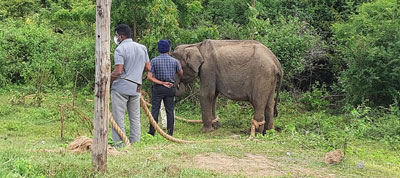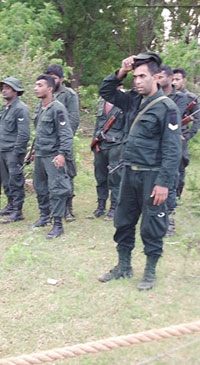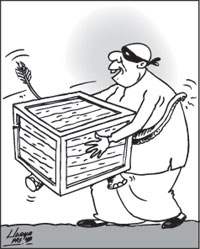News
Many shady suspects in Udawalawe park elephant calf capture
Illegal capture of elephants from the wild once again came to the fore this week when a calf, estimated to be between six and seven years old, was found bound by coir ropes to trees, seemingly sedated at Udawalawe National Park.
Environmentalist and researcher Supun Lahiru Prakash said that in Sri Lanka there were many bad actors involved in capturing and smuggling of elephants.

The calf identified as “Kalana” had been at “Ath Athuru Sewana" and later released to the Udawalawe National Park only to be captured by wildlife criminals
He said activists had warned the Government of the consequences of gazette No 2241/41 on August 19, related to captive elephants. Unregistered elephants can now be registered. This opened up an opportunity for smugglers.
Politicians change laws, and the clergy clamours for elephants for cultural events. This helps creates the environment for racketeers, he said.
Mr Prakash added that even some veterinarians and trackers too were involved in the illegal trade.
As a result, dedicated wildlife officers become discouraged.
Army media director, Brigadier Dilantha Premaratne told the Sunday Times that the incident was observed during a foot patrol at dusk on Wednesday by the Gemunu Watch troops of the 581 brigade under the 58th division of the security forces headquarters.
“The 581 brigade troops go on foot patrol in Udawalawe National Park and Lunugamvehera National Park on the request of the wildlife authorities to nab poachers and others who engage in illegal activities,’’ he said.
He said soldiers found an elephant tethered to the tree and alerted wildlife officials.
Udawalawe National Park warden Rasika Ranatunga said officers had been told that a captured elephant had been seen near the Panahaduwa beat office. “We were told that a man dressed in shorts had fled the site. Some accounts say those who had first spotted the elephant had seen four more persons fleeing in the different directions.”
Mr Ranatunga said that a few years back, elephants had been captured from the same area. “When we reached the elephant it was about 8:30pm. It appeared to be drugged and was suffering from diarrhoea.’’ The animal had been sedated and tied up.
With the help of officials and army soldiers, the animal was transported to Udawalawe “Ath Athuru Sewana’’.
He said the elephant captured by smugglers was identified as “Kalana” which had been at “Ath Athuru Sewana’’ and later released to the Udawalawe National Park.
“We are investigating the incident. The use of sedatives suggests there is a sophisticated group involved in capturing elephants.’’

Gamunu Watch troops at the scene of the wildlife crime. Pix by Rahul Samantha Hettiarachchi
However, environmentalists claim that wildlife officers would have known of this attempt considering vehicles are needed to transport the elephant and that smugglers would have to come through the village and also enter the park.
Sources said the army petrol had also found an elephant-tracking radio collar one kilometer away from the area where the elephant was found. But it did not belong to this particular elephant.
A wildlife official said they had also found some items believed to have been left behind by the suspects and would be using them as case items.
Activist Ven. Pahiyanagala Ananada Thera told the Sunday Times elephant smuggling had not stopped even though there were lawsuits.
He said the Attorney General’s Department and the Criminal Investigation Department’s actions had led to the release of illegally captured elephants to those who claimed ownership.
“Sri Lanka is like Kenya, the Government and the authorities support the smugglers. Sadly we have to say that the wildlife officials, too, directly and indirectly support elephant smugglers,’’ he said.
The capture and smuggling attempt happened in a heavy security area with a police station, army barriers as well as Wildlife Department protection.
Opposition Leader Sajith Premadasa told Parliament that this could be the beginning of a wave of illegal elephant captures. He said that the government should support the breeding of elephants for cultural events and take action against rackets involving wild elephants.
A senior policeman in the area wondered how the smuggling attempt unfolded, despite the presence of the army camp, the wildlife beat office and animal treatment center run by the Department of Wildlife Conservation.
Additional reporting by Rahul Samantha
Hettiarachchi


